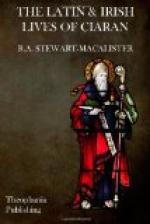“A maic in tsaeir, cot clasaib, cot coraib, It casair chaeim, cot cairpthib, cot ceolaib.”
The transposition has probably been caused by the error of some scribe who copied first the parts of the two lines preceding the caesura.]
[Footnote 6: The roll of the Kings of Tara was evolved from various sources by the Irish historians of the early Christian Period. Tigernmas was properly a pagan culture-hero, to whom was traditionally attributed the introduction of gold-smelting and of other arts, and who was said to have perished, apparently as a human sacrifice, at some great religious assembly.]
[Footnote 7: This is certainly the reading, curiously misread in LL p. 356, (Irish text), and in VSH i, p. li, note 3.]
[Footnote 8: Ossianic Society’s Transactions, vol. v, p. 84 ff.]
[Footnote 9: Edited by Dr. Hyde in Celtic Review, vol. x, p. 116 ff.]
[Footnote 10: On this whole subject see Chapter IV of MacNeill’s Phases of Irish History, a book which may be unreservedly recommended as giving a clear and accurate view of the early history of the country.]
[Footnote 11: It may be noted for the benefit of the reader unaccustomed to Irish nomenclature, that persons are named in one of the following formulae: “A mac B” (mac, genitive mic, in syntactic relation mhic [pronounced vic] = son): “A o B” (o or ua, genitive ui = grandson or descendant): and “A maccu B” (maccu = descendant, denoting B as the name of a remote ancestor). Of course the name B will in every case be in the genitive.]
[Footnote 12: For division of labour between the sexes, see Frazer, Spirits of the Corn and of the Wild, ii, 129. For prohibitions of the presence of males when specifically female work was being transacted, Plummer quotes Grimm, Teutonic Mythology, Eng. Trans., iv, 1778 ("Men shall not stay in the house while women are stuffing feathers in the beds, otherwise the feathers will prick through the bed-ticking"). O’Curry (Manners and Customs, iii, p. 121), commenting on this story, refers to times and seasons deemed unlucky for dyeing, at the time when he wrote; but the prohibition of the presence of males was forgotten.]
[Footnote 13: Vafthrudnismal 41; Grimnismal 18. (Edda, ed. Hafn, 1787, vol. i, pp. 24, 48.)]
[Footnote 14: F.M. Luzel, Contes populaires de Basse-Bretagne (Paris, 1887), vol. i, p. 219 ff. Some other parallels are quoted by Plummer, VSH, i, p. cxliii, note 5.]
[Footnote 15: There is evidence from various literary sources that cattle thus peculiarly coloured were accounted sacred in ancient Ireland.]
[Footnote 16: There should be no hypermetric syllables, but I have been unable to avoid them.]
[Footnote 17: Horae Hebraicae in Evangel. Matt., xv, 36, following the tract Berakoth.]




